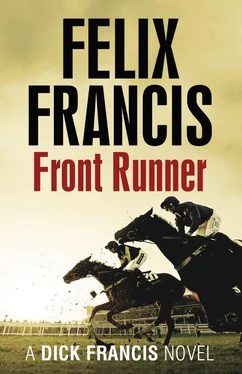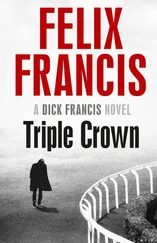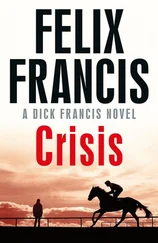‘I banged the hull to alert the others, man,’ Carson said. ‘Now on our way to the nearest beach. I called an ambulance, man. It’ll meet us there.’
Good old Carson, man.
I never did get to eat my traditional Christmas lunch at Martin and Theresa’s house. Instead I spent the next hour and a half in a pressurized hyperbaric chamber at the Grand Cayman Hospital breathing 100 per cent oxygen, and I was kept there for most of the afternoon for observation.
My time in the chamber had certainly made me feel better.
The headache slowly faded away to nothing and the feelings of nausea went with it. By the time I was allowed to see Henri, I was itching to get out of the hospital.
‘Don’t be so impatient,’ she said. ‘The bends can be nasty.’
But how could I have had the bends? I had checked the dive depth tables myself. Both dives had been well within the recommended limits, especially since I’d chosen not to go down as far as a hundred feet in the first one. There was no way I should have had any problem with decompression sickness.
And I’d had the headache long before Henri and I had started to ascend to the surface. That’s when the bends would have surely happened, and without a headache as a warning.
Henri went back to Martin and Theresa’s house for the noontime champagne with friends.
‘I promise I’ll come back later,’ she said to me as she left. ‘I’ll bring you some turkey.’
A little while after she’d gone, a doctor in a traditional white coat came to see me.
‘Not the best way to spend Christmas Day for either of us,’ he said.
‘I’m sorry,’ I replied.
‘It’s not me you have to apologize to,’ he said. ‘I was always going to be on duty here today. But our phlebotomist is a different matter. You may need to buy her a drink for giving up an hour of her Christmas morning.’
‘Phleb who?’
‘Phlebotomist,’ he said. ‘Someone who takes blood.’
‘Ah.’ I could vaguely remember someone sticking a needle into my wrist just before I was placed in the hyperbaric chamber.
‘I asked her to come in to do an arterial gas test on your blood.’
‘And?’ I said.
‘The results show that you had severe carbon monoxide poisoning.’
‘Carbon monoxide?’
‘Yes,’ he said, ‘and you’re lucky to be alive. You had over thirty per cent of carboxyhaemoglobin in your blood when you arrived here. It would have been even higher before you were given oxygen to breathe on the boat.’
‘Is that bad?’ I asked.
‘Normal levels are about one per cent.’
Maybe I didn’t look sufficiently alarmed.
‘Let me explain,’ he said. ‘Oxygen is constantly needed by your muscles and brain in order for them to function. When you breathe normal air, the oxygen molecules in your lungs latch onto the haemoglobin in your red blood cells and are transported around your body. But, if you breathe air that is contaminated with carbon monoxide, then the CO molecules attach to the haemoglobin instead of the O 2ones, forming carboxyhaemoglobin. And that prevents the blood carrying oxygen. Haemoglobin is two hundred times better at absorbing carbon monoxide through the lung walls than it is oxygen, so it’s very serious, even at low concentrations.’
‘Wouldn’t I be able to taste it?’ I asked.
‘Carbon monoxide is odourless and tasteless. People die of it all the time without ever knowing it, especially in tents and caravans when they use heaters without proper ventilation.’
‘But how did it happen on a dive?’ I asked.
‘I suspect you were breathing from a tank that was contaminated with carbon monoxide,’ he said. ‘I had my doubts when you first arrived. The ambulance staff said you had the bends but you didn’t present the usual symptoms. Decompression sickness is referred to as the bends because the agony in the joints tends to bend people over. But you were pain free. That’s why I arranged for the arterial gas test. Fortunately treatment for the bends and for CO poisoning are exactly the same — one hundred per cent oxygen in a hyperbaric chamber — so that’s what we did, even before we had the test results.’
‘Thank you,’ I said. ‘But how could such contamination happen?’
‘Easily. In the past it was quite a common problem but people are usually more savvy and careful these days, so such accidents are now rare. Air compressors are used to fill the tanks and most are driven by petrol engines. If the air intake valve for the tanks is placed too close to the exhaust of the engine then you can partially fill the tank with carbon monoxide. That would be enough.’
‘So I wasn’t eaten by a sea monster,’ I said, mostly to myself.
‘Eh?’
‘Nothing,’ I said. ‘I must have been hallucinating. I imagined I was being eaten alive by a sea monster.’
‘The brain does funny things when it’s starved of oxygen.’
‘But how come I’d been underwater for more than twenty minutes and was fine apart from a headache, and passed out only as I was coming up to the surface?’
‘That is quite normal,’ he said. ‘It’s to do with the increased partial pressure of oxygen that compensates at depth. It reduces as you ascend and hence the manifestations of the poisoning become more apparent.’
I didn’t understand, but at least the doctor seemed confident that he knew what he was talking about.
‘Will there be any lasting effects?’ I asked.
‘There shouldn’t be,’ he said, ‘not after breathing pure oxygen at high pressure, as you did in the hyperbaric chamber. It drives the carbon monoxide out of your system. We’ll keep you here for a few more hours, just to be sure, but I’m pretty certain you’ll be able to go home later.’
The doctor went away and I lay my head back on the pillow.
Carbon monoxide in a contaminated dive tank.
Take the yellow guest tanks, Martin had said to me on the boat. Had that been because he had known that one of them, or even both, had been purposely contaminated with poison gas?
Or was I just being paranoid?
Perhaps it had just been an unfortunate accident as the doctor had suggested.
Maybe. But I’d spent far too much time in hospitals recently, and being stabbed thirteen times certainly hadn’t been accidental.
Henri came back at two o’clock with a large tray holding two plates, over which there were metal covers.
‘I couldn’t eat my Christmas dinner at Martin’s place, not without you being there, so I brought it to have with you here.’
She removed the plate covers with a flourish, like a magician revealing a white rabbit. Underneath were two large platters overflowing with roast turkey plus all the trimmings.
Henri even produced a pair of Christmas crackers from her handbag.
‘How lovely,’ I said.
I didn’t have the heart to tell her that, just an hour previously, I’d been served an identical Christmas lunch from the hospital catering trolley. But that one hadn’t been particularly tasty and, fortunately, my only-half-eaten attempt had been collected just five minutes before Henri arrived.
This one was much better and, to my great delight, Henri had also smuggled in a thermos flask, full not of hot coffee, but of ice-cold Chardonnay, which we drank out of plastic hospital beakers.
We pulled our crackers and put on our paper hats.
‘Why did the bicycle fall over?’ Henri read from her joke slip.
‘No idea,’ I said.
‘Because it was two tyred.’
We both groaned.
‘What’s yours?’ Henri said.
‘What is Good King Wenceslas’s favourite pizza?’
‘I don’t know.’
‘Deep pan, crisp and even.’
More groans.
‘That’s even worse than mine,’ Henri said.
Читать дальше












